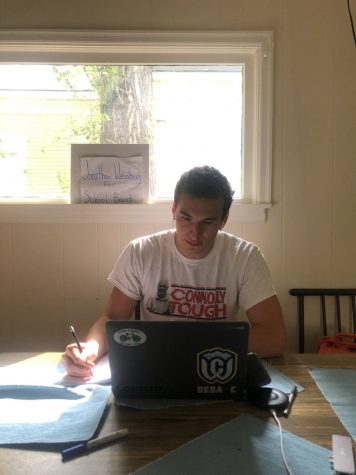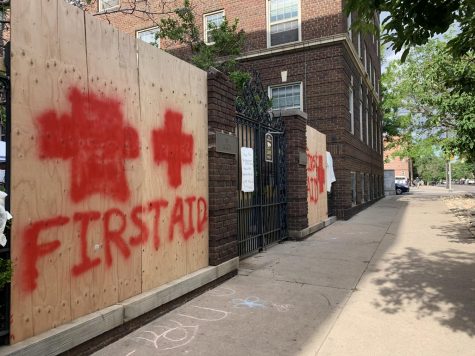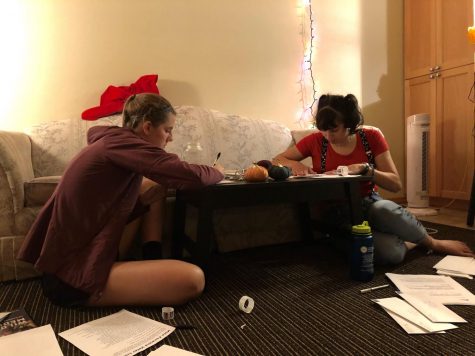Getting political
October 22, 2020
As the election grows closer, Whitman students across the country are finding ways to be politically active. For most students, this is their first time voting in a presidential election. The Whitman Votes club has also been working on projects to encourage voting and students have used the moment to do their own letter writing, phone banking, participation in protests and even campaigns for their own election.
“Being involved in political conversation but knowing that I wasn’t actually doing anything was beginning to bother me,” Cora Patz said, a sophomore who is interning via Zoom with Flip the West.
The goal of Flip the West is to flip U.S. Senate seats from red to blue. Patz works around eleven hours per week on phone banking and outreach management. She likes that the organization is more focused on reaching underrepresented communities instead of convincing Trump supporters.
“While the presidential election is important, the senate is a great back up and also just as important to have any real change,” Patz said.
She originally thought she would not like phone banking. However, she now enjoys the rewarding feeling after convincing someone to vote democrat or getting them to remind their friends.
“I’m definitely learning a lot about how to persuade people and that involves understanding their viewpoints and the things that they care about,” Patz said.
Senior Sarah Bosworth voiced a similar opinion as she considered her volunteer work phone banking in Washington state for Dr. Kim Schrier’s re-election campaign for Congress. She also helped two years ago for Shrier’s first campaign. Many of the people she talks to are undecided voters or people who do not plan on voting.
“The most rewarding part of the work by far is actually getting through to someone and convincing them to vote,” Bosworth said.
Representative Shrier’s place as the only woman doctor in Congress makes her reelection very important to Bosworth, particularly in terms of health issues and reproductive rights. She also gets to interact with Georgia Seltzer (’20) who is a field organizer on the campaign and Bosworth’s sorority sister.
Another student participating in phone banking is junior Leah Samuels who, from her home in Montana, is volunteering with several local partisan groups and the Steve Bullock for Senate campaign. Since she was sixteen, she has either been volunteering or working for political campaigns. She was motivated by a need to find some sense of control out of the difficult 2016 election of Donald Trump.
“Just a lot of my personal beliefs, and some of my rights as a woman, as an LGBTQ person it’s scary to have someone like that in office. For my friends who aren’t white, I’m very worried about them,” Samuels said.
Reflecting on her own privilege, she felt a need to step up for people who are not able to volunteer. People in Montana can lack a steady internet connection. This makes her concerned that the people who rely on certain politicians becoming elected for their healthcare or otherwise will not have an equal opportunity to speak up. Phone banking has been an empowering way to reach out to these voters.
“There is a good possibility that Montana could vote blue, which is pretty amazing,” Samuels said.

While some students are encouraging people to give their vote, Jonathan Weinberg is actually on the ticket. A junior from Concord, New Hampshire, Weinberg is running for a seat on the school board in his hometown. He hopes to add the nuances of the student perspective to the district school board. He is the youngest person to ever run for this position in Concord, and possibly the state. One of his goals is to increase the visibility of the school board.
“The school board in Concord has over a 90 million dollar budget and for people to not know what they do, to know who they are, is a little disturbing. So I hope to bridge that gap between the students and the board,” Weinberg said.
In the position, he would like to address equity issues and diversify hiring. He also understands the responsibility of the school board in deciding how to carry out pandemic learning. He has been involved in difficult issues since a young age when he participated in a migration reform lobbying effort with his synagogue and later being highly involved with the gun violence prevention movement as a high schooler.
Help from friends, a city councilor and Zoe Kelly ’19 have been essential to his campaign. They have put together a social media outreach campaign, produced yard signs, and worked to get endorsements published in the local paper. The campaign is mostly online, but he does try to do socially distanced outreach at the local farmers market.
“People underestimate down ballot races and especially local politics. Especially, right now when we see the absence of leadership on a federal scale the local politics become that much more important,” Weinberg said.

One student who has witnessed the frustrations of lacking leadership is first year Jack Ray. He has participated in several protests in his home state of Colorado. In March and April he attended Black Lives Matter protests at the capitol in Denver. Protestors were immensely frustrated over a lack of federal leadership. Chants targeted President Trump negatively and with profanity.
“One of the things that I found very powerful was the fact that the capitol building windows were smashed and boarded up, a lot of broken lights, a lot of graffiti on the capitol building,” Ray said.
It was upsetting to him that people felt the need to put their lives at risk in order to have their voices be heard. He would leave before he felt in danger. He stills has mixed feelings and emotions as he looks back.
“Happy that many people were out there speaking up against this injustice, but sad that it exists in the first place,” Ray said.
In regards to the coming election, he feels forced into a difficult situation. Although he will vote for Joe Biden, he would rather have had Bernie Sanders as the nominee.
“I don’t feel like either one [Joe Biden and Donald Trump] intends to be working towards racial equality.”

In spite of frustrations, Whitman students are aware of the deep importance of this election. Voter turnout is often key and even just a few hours of work can lead to real results. Students have been using the nonpartisan letter-writing platform Vote Forward to make activism a part of their lives. Junior Jess Zaslove usually spends Wednesday evenings baking with her housemates, so one day they decided to also make it a letter writing night. Each person picked a state and wrote twenty letters, making a house total of one hundred letters over five housemates.
“It’s a stressful election but it’s been great to feel like there’s actually something we can do,” Zaslove said.





